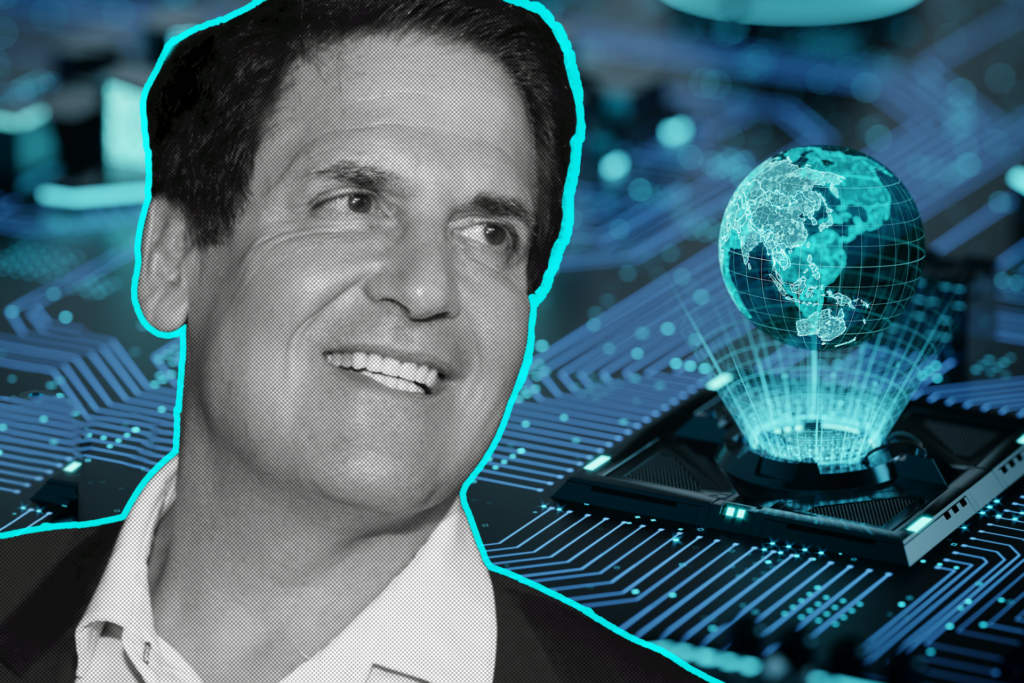Mark Cuban on AI, Elon Musk, and Big Tech’s influence on society and elections
By Sara Goudarzi | October 28, 2024
 Photo-illustration by Thomas Gaulkin; Images by Gage Skidmore (Mark Cuban photo; CC BY-SA) and Depositphotos.com
Photo-illustration by Thomas Gaulkin; Images by Gage Skidmore (Mark Cuban photo; CC BY-SA) and Depositphotos.com
On October 19, the richest man in the world, CEO of Tesla and SpaceX, and CTO and executive chairman of X Elon Musk, who has been backing former president Donald Trump, announced cash incentives to voters in swing states. Specifically, he extended $100 to voters who signed a petition supporting the first and second amendments in Pennsylvania, a key swing state. Musk also offered $1 million each day until the election through a raffle to a registered voter who signs the petition in one of the seven swing states.
The move has sparked much debate about the legality of such incentives, including a tweet from Dallas Mavericks co-owner, television personality, and ultra-wealthy entrepreneur Mark Cuban, who questioned whether the scheme violates voting or gaming laws in Pennsylvania.
Cuban, a onetime supporter of Trump’s initial presidential aspirations who is now supporting Vice President Kamala Harris, has differed with Musk on not just politics but a variety of other issues, including social media and artificial intelligence. Musk was a signatory to a March 2023 open letter urging developers to pause the training of AI systems more powerful than ChatGPT-4 for six months, citing “profound risks to society and humanity.” Cuban, on the other hand, believes that it’s crucial to limit government regulation on AI so the United States can retain a leading position in the technology to maintain its economic and military position in the world.
I interviewed Cuban via email to get his thoughts on some of these issues, including the tech sector’s influence on politics and government.
The resulting interview has been lightly edited for length and clarity.
Sara Goudarzi: You have been campaigning for Kamala Harris and against Donald Trump of late. Why?
Mark Cuban: I believe Kamala Harris will be a far better president for our country.
Goudarzi: Over the last several years, a handful of tech companies—such as Google, Apple, Meta, Oracle, X, OpenAI—have amassed enormous power and influence over, among other things, the flow of information and communication. Their decisions on what gets seen can impact everything from public health to policies to elections. Artificial intelligence seems likely to even further concentrate power in the hands of a relatively few tech companies and their leaders. Do you view this concentration of power as a problem? If so, what can be done, in a democratic system, to help solve that problem?
Cuban: That’s two questions: The first is on algorithms, particularly on social media. I think it is an issue. It creates our own personal echo chamber where the algorithm continually sends more of what you have already consumed in an effort to get you to consume even more. Given most are unique to the user, we all have our own personal wormhole. I’m not sure you can do much of anything [in this regard] because creating an algorithm is as deserving of free speech as writing a book.
As far as AI, it’s too early to tell. This is like the early days of mainframes, where each manufacturer required significant, expensive resources. Over time, it became cheaper and cheaper to build increasingly powerful computers and software, which made them mainstream to build or buy.
The same can be said of the different forms of AI. Right now, it’s truly expensive and resource-intensive. Domination in AI is imperative for the United States to retain our economic and military positioning in the world, so it’s the domain of government and our biggest companies.
Over time I think the price performance curve for equipment necessary to run today’s most advanced AI options will follow that of technology we have seen over the last 50 and more years. As it [the price] drops, it will be more accessible for all but the most advanced models used by the military and new applications. For the rest of us, there will be tens of millions of models that we will create and use as consumers and businesses.
Goudarzi: What, in your opinion, happens when someone who owns a social media platform, like Elon Musk, not only removes guardrails that combat misinformation and disinformation and limit hate speech, but also decides to publicly back a political candidate? Is this a problem, or is Musk simply doing what any media owner could do?
Cuban: Owning a social media platform, surely for Musk, Zuck [Mark Zuckerberg], or anyone, is a power trip—no question about it. But it’s not all that different than what Rupert Murdoch has available to him.
Everyone wants to be Charles Foster Kane, and eventually they will all want their sled.
Goudarzi: You questioned the legality of Musk’s latest scheme of offering cash incentives to voters. The move is concerning at best. Should there be clear laws and better checks and balances to curtail such actions?
Cuban: That’s up to the people of each state. I’m not a fan of what he is doing. But I also believe it will backfire. It seems desperate and diminishes the value people place on their votes.
Goudarzi: In 2022, Musk wrote on twitter (now X): “…my historical party affiliation has been Independent, with an actual voting history of entirely Democrat until this year.” Similarly, other Silicon Valley members like former COO of PayPal David Sacks, who previously supported Hillary Clinton, are now backing Donald Trump. Historically, Silicon Valley has been more liberal. Why do you think these folks are now rallying around the former president?
Cuban: When there were questions about Biden’s ability, it made perfect sense to them to switch to Trump, particularly since many believe they could influence him. Now with Kamala, I think they regret it, but they so publicly identified with Trump, they feel they have no choice but to stay with him. I’m guessing they feel that “worst case it’s only four years” and best case they can influence him to do what they want.
Goudarzi: Other social media owners who are not as vocal about their political allegiances, like Mark Zuckerberg, can, and still do, wield their influence in other ways, such as suppressing content and controlling how many eyeballs a post gets. Social media platforms have positive impacts, but they have had definite negative impacts on everything from politics and democracy to mental health. Do you think the United States government needs to increase its regulation of social media platforms? If so, how?
Cuban: We need to understand the how first. I think the best first step is if a platform has users of 16 and under, they are required to publish all their source code for their algos and provide an HTML page with a link to all videos or images shown to the child available to parents to see at any time. Nothing tells you more about a child than their social feeds on TikTok, insta, and YouTube.
Goudarzi: To take that one step farther: Because a handful of individuals and companies control so much of tech that’s pertinent to people’s daily lives, commerce, communication, and military, what happens when they decide to defy governments? Musk, for example, was resistant, when asked by the Brazilian government, to curb problematic content on X. He ended up giving in after a judge ordered the platform to be blocked in the country. What happens when he won’t give in (quite a few countries rely on Starlink satellites, for example)? Are we then looking at a society where billionaires—without actual governing or military experience—will end up with more power than governments? Why is this problematic?
Cuban: I don’t think it’s much different than when three TV networks and one or two newspapers and a few radio stations controlled all media. Rupert Murdoch is as powerful, or more so, than any of them.
As for tech: The military has to be equal in technology. I realize that Elon has outsized influence because of SpaceX and to a lesser extent Starlink, but there are competitors. We need to support them. Technology changes rapidly enough that by the time the feds figure out their first response, the world will be different. We need to make sure that the government has a president that understands tech well enough to emphasize winning AI, like Kennedy wanted to go to the Moon.
Goudarzi: You’ve been vocal about limiting government regulation on AI in favor of innovation to ensure the United States stays ahead of China in the AI race. Do you worry about AI’s role in spreading misinformation—election related or otherwise—and what solutions, if any, do you think could be effective in combating AI deepfakes and misinformation? Do you see any role for the government there?
Cuban: There are Name, Image, Likeness rules in place. There are copyright and trademark rules. We need to adapt them to the digital age much as we did with the digital copyright act.
You can’t train an AI model very well using only data that another model creates or public domain materials. It has to use a wide base of information to be trained. Almost all of that is copyrighted material. If we enforce those laws, I think the foundational models will be paying IP owners much like Netflix paid movie and TV studios.
Goudarzi: Do you fear you will suffer negative consequences for your opposition to Donald Trump if he wins the presidential election?
Cuban: I don’t know.
Goudarzi: Will the Dallas Mavericks agree to visit the White House after they win the 2025 NBA championship, regardless of who wins the presidential election in November?
Cuban: That will be up to the players. But I would guess so. Let’s hope we have to decide.
Together, we make the world safer.
The Bulletin elevates expert voices above the noise. But as an independent nonprofit organization, our operations depend on the support of readers like you. Help us continue to deliver quality journalism that holds leaders accountable. Your support of our work at any level is important. In return, we promise our coverage will be understandable, influential, vigilant, solution-oriented, and fair-minded. Together we can make a difference.
Keywords: 2024 election, AI, Donald Trump, Elections, Elon Musk, Kamala Harris, Mark Cuban, Silicon Valley, big tech, social media
Topics: Disruptive Technologies
















The problem is one of backbone and courage.
Thank you, Sara for an interesting insight piece. Continued success!